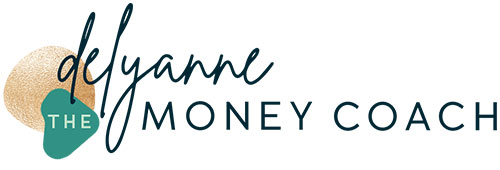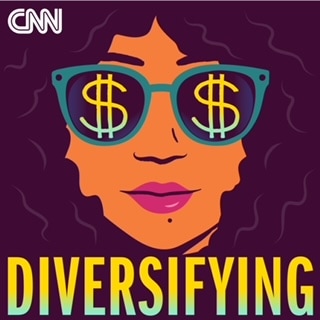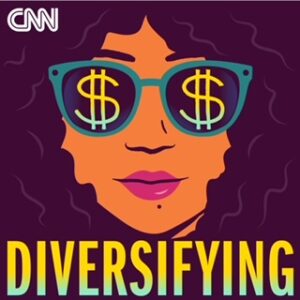Housing costs in America are at an all-time high and a lot of people are wondering if the American Dream of home ownership is right for them. This week, Delyanne Barros digs into the pressure to become a homeowner; the costs and benefits of buying; and how one couple has nearly eliminated their housing costs by “house hacking”. This week’s guests: Yesenia Capalbo and Ali and Josh Lupo of The FI Couple.
If you enjoy Diversifying, CNN would love to hear from you. Please visit https://cnn.com/financepod to take a brief survey.
Episode Transcript
Yesenia Capalbo
00:00:02
I started to just have dreams about, you know, having a backyard and having a family and having stability, and I think it was that craving for stability to sort of start planning roots and building a community that I wasn’t getting during renting.
Delyanne Barros
00:00:17
That’s my friend and former colleague Yesenia Capalbo. She bought her first home six years ago at 28 years old. Now I’m still a renter. I feel like that’s what makes financial sense for me. But I get where she’s coming from and why homeownership makes sense for so many people.
Yesenia Capalbo
00:00:33
You remember when I used to rent for eight years, it was like I was moving every year and the rent hikes were getting annoying. I was sick of paying rent because I just felt like I was throwing money away. I felt like it wasn’t going towards anything. I was moving out of each apartment with nothing to show for it.
Delyanne Barros
00:00:48
It’s so interesting when I hear people say that, like I’m throwing money away, and obviously I disagree with that mentality because I myself rent, but also because I am purchasing something. I’m living in my home. I am getting something out of it, right?
Yesenia Capalbo
00:01:01
I do think it is throwing money away when I move out of here, like, that’s our money. I can’t say the same for renting, for renting. Like, you don’t see anything for it when you move out.
Delyanne Barros
00:01:10
But for a lot of people like me, owning a home can feel stifling and limiting. And guess what? There’s no one right answer, especially now that both housing and renting prices have skyrocketed. I know we’ve all been told that owning a home is synonymous with the American dream. But is that still true, or is the American dream about making your own version? That reflects where we are now? I’m Delyanne Barros. This is diversifying.
Yesenia Capalbo
00:01:46
Like a large part of how me and my husband built wealth was through home ownership, right, like we started with our investment property, we sold it, I paid off my student loans. I bought my first starter home and then that starter home helped us find what we call our dream home. I think it can be a very rewarding experience to own property.
Delyanne Barros
00:02:06
Yesenia and I met 10 years ago when we both worked as employment attorneys. Since then, I’ve stayed a devoted renter because I love the freedom of movement that comes with it. Yesenia took the homeownership route as her path to stability and wealth building.
Yesenia Capalbo
00:02:20
We’ve been very happy in our home. The last few years.
Delyanne Barros
00:02:23
And you’re how old now?
Yesenia Capalbo
00:02:24
I am thirty-four.
Delyanne Barros
00:02:28
Don’t make sounds like that when you’re talking to somebody who is older than you.
Yesenia Capalbo
00:02:32
It’s just, I forget, because sometimes I’m like, Oh, I turned thirty five already. I don’t know. I don’t want to accept it.
Delyanne Barros
00:02:37
No. Don’t skip ahead. All right. So let’s talk about, you know, the home ownership dream. Like, how did that start out for you? I know you’re Latina like me, you’re Dominican. So tell me how that started out and how it played out in your family conversations.
Yesenia Capalbo
00:02:52
Yeah. So, you know, I like to go back as far as my grandfather. When you know, in Dominican Republic, they’re like, I guess, two major ways that you build wealth. It’s through owning your own business and owning property. Right. And when my parents immigrated to this country, you know, we rented in like low income housing in the Bronx. But it was always with the eye of we’re going to save as much money as possible. We are going to work as much as possible so that we can own property. That is the American dream.
Delyanne Barros
00:03:18
Why do you think that Latinos especially are so focused on only building wealth through building a business or owning homes? Why do you think they discount the stock market altogether now?
Yesenia Capalbo
00:03:29
So this may be total speculation, but just in conversations with my parents, right? Like in Dominican Republic, like, it’s so risky. Like they don’t even trust banks, right? Like my mom talks about how she watched her mother lose all of her money, like a bank just closed and she never recovered, like she didn’t get that money back. And so my mom to this day, even though she has like savings account checking account, she’s still telling me, Don’t hide your money in the banks. Don’t trust the stock market. Everything could fall tomorrow, but there’s something about like homeownership, right? This is how you’re going to pass on wealth to your children.
Delyanne Barros
00:04:03
Yesenia took the knowledge her mother gave her and applied it to her own life. She and her husband bought an investment property early on in their marriage. From there, they were able to purchase their own starter home.
Yesenia Capalbo
00:04:15
I think my husband and I did have the conversation about whether this was going to be like our forever home or if this is something that was just going to be starter. So it’s not going to check all of our boxes. And we did decide that, you know, especially with how much we had saved that a starter home just made more sense for us.
Delyanne Barros
00:04:31
What job industries were you both in at the time that you purchased the home?
Yesenia Capalbo
00:04:34
So I was a lawyer, employment lawyer, but not making much money. Initially, my salary was like forty five thousand. It was like very low. And then my husband, he I think at that point, he was a pharmaceutical sales rep, and so he wasn’t like making six figures. But he he’s such a good saver. He’s he’s the one that taught me everything about budgeting and saving. And, you know, we can make a dollar stretch very, very far. So I think that definitely helps in saving for a down payment.
Delyanne Barros
00:05:02
How much you need to purchase a home varies a lot depending on where you live and what you’re looking for, a good first step is to start looking around online to get a sense of pricing. The traditional down payment is usually 20 percent. Putting that much down or more can lower your monthly payments. But it’s definitely possible to buy a house with a much lower down payment. More on that later this episode. Instead of saving for a long time for your dream home, consider instead a starter home where you can start building equity. But don’t forget that there are other costs to consider, like closing fees and property taxes, which vary depending on where you live. You also need to think about routine maintenance and emergency repairs after you move in, and Yesenia has a pretty gnarly story to show why that’s so important.
Yesenia Capalbo
00:05:53
I don’t know if you’ve heard this story before, but it’s it’s so gross that I still have PTSD about it. It was just like, Welcome to homeownership, like this is this is what it’s like. We had just bought our first home and my husband went to check in on the property and he goes into the basement and he calls me and he’s screaming at the top of his lungs because the entire basement is covered in poop. Yeah, yeah, I know it was. It was. It was a lot. It was like covered and I mentioned to you, right? The home had been renovated before we bought it. Not only did we both have to like physically clean up this mess right over the course of two days, but then we had to hire like plumbers and I think like additional people to come in, find out what the issue was. We didn’t even get it resolved.
Delyanne Barros
00:06:39
I would rather have a roof cave in than have that situation, and I can’t believe you had to clean it yourself. Oh my God, I can’t even imagine. But this is why I tell people, you can’t just go by that 20 percent down payment. People are so focused on that 20 percent, and then they just stop there. You have to have an emergency fund like on top of that, because something will happen. Poop aside, there’s a lot to consider when it comes to buying a home. One of the most important things I think people should consider is why they want to buy. Is it really the best financial choice for you at this moment or is it based on all the messaging you’ve picked up, either from your family, the media or your culture?
Yesenia Capalbo
00:07:23
I don’t think it’s for everyone, and it shouldn’t be the marker of success because there’s other better ways of generating wealth. I think, you know, our parents lived in a different time. They weren’t saddled with student loan debt. They were probably getting, you know, their down payment from their parents. For me, it doesn’t feel like I’m tethered or like, I’m stuck here, like it feels very free to live in my own home.
Delyanne Barros
00:07:46
Now we’re going to take a quick break, but stay tuned because we’re going to share everything you need to know about hacking. No, not computers. Houses. Welcome back before the break, you heard from my friend Yesenia Copalbo on how and why she made the decision to become a homeowner. She mentioned that we live in a different world from our parents with more student debt and higher housing costs. Owning a family home might be a traditional financial choice, but these days some people are taking a not so traditional path to get there.
Ali Lupo
00:08:24
We are Ali and Josh. We are from upstate New York.
Josh Lupo
00:08:28
So if we just go back a few short years, maybe five years ago, Ali had just finished her master’s program.
Delyanne Barros
00:08:35
That’s Ali and Josh Lupo, aka the FI couple on social media. F I stands for financial independence. They’re both in their early 30s and they met in college. After graduation, they moved into a luxury apartment building together.
Ali Lupo
00:08:50
It was 2018, the year of our wedding. This is our year. And two weeks into the year, Josh totaled his car and got laid off from his employer of seven years.
Josh Lupo
00:09:00
I have no income. I literally was driving for Uber listening to podcasts, and I didn’t know how to roll over a 401k.
Delyanne Barros
00:09:08
On top of that, they had over $100000 of student debt hanging over their heads, with no real plan on how to pay it off.
Ali Lupo
00:09:16
So Josh came to me one day and was like, I want to be landlords, I want to retire early and I want to sell your really nice car. And I was like, Holy shit, I’m marrying this guy in three months and he is crazy. Like, he has lost his damn mind, and I think everyone around him thought he lost his mind.
Delyanne Barros
00:09:34
Josh had stumbled across the concept of house hacking, a way of generating income from your home by buying multifamily properties. You live in one unit and use the rent from the other units to pay your mortgage.
Josh Lupo
00:09:47
So when I got fired, I did have some money from an employer 401k, and so I used that. We had some money for my wedding. And then just through general savings, we had accumulated fourteen thousand two hundred dollars, which is pretty much our entire life savings. And we use that as a down payment and it covered our closing costs as well.
Delyanne Barros
00:10:10
So they took that fourteen thousand dollars and used it as a down payment for the one hundred and fifty five thousand dollar duplex. That’s basically a five percent down payment, which is way less than that traditional 20 percent. We’re always hearing about the reason why people put 20 percent down is to avoid something called PMI or private mortgage insurance. It’s basically having to pay a premium for putting in a lower down payment, and many people are under this impression that it can be a lot of money and therefore something you have to avoid at all costs. But for Ali and Josh, it only costs them an extra $40 a month.
Ali Lupo
00:10:49
And our monthly mortgage was, well, thirteen hundred.
Josh Lupo
00:10:53
It was one thousand three hundred and eighty four dollars, and the person who was already living there in the other apartment was paying seven hundred and twenty five. So just basic math. We knew, OK, this is probably going to cut our monthly housing expense, not including, like, you know, utilities and stuff, at least in half. And that was the first time I felt like we started having some breathing room. And that became kind of the weapon, if you will, for how we started attacking over six figures of student loans.
Delyanne Barros
00:11:23
A year and a half later, they were able to buy another property down the block and do the same thing.
Josh Lupo
00:11:28
So in about two weeks, we’re closing on our third rental property.
Ali Lupo
00:11:32
What’s exciting about this property, though, is that we hit our live for free goal, so the income from property one that is left over actually pays for any expenses that we have here, which again, was that weapon towards really hammering down that debt in a very meaningful way.
Delyanne Barros
00:11:49
So your real estate right now is covering all of your living expenses, so the money that you’re bringing in from your job is just extra.
Josh Lupo
00:11:56
Yeah. So it covers all of our housing expenses. And frankly, I mean, by not having a housing payment and not having car payments other than, you know, like occasional gas and maintenance. I mean, that’s the majority sometimes of the average person’s budget. So it allows our expenses to be fairly low. We’ll have the cash flow needed to buy a nice starter home in our market. Nothing overly fancy, but it’ll be a home, which we’re really excited about.
Delyanne Barros
00:12:24
I know that, you know, landlords get a bad rap, right? Obviously. Like when people are frustrated about housing prices, renting all of that. I think that a lot of people vent their frustrations towards landlords. What do you have to say to people who come to you with those frustrations?
Ali Lupo
00:12:40
I’m glad you brought that up because we hear those frustrations all the time. I think when you’re a landlord and you put your face out on the internet, that is inevitable. Josh and I like to refer to ourselves as small potato investors. So we’re not mega investors. We’re not buying blocks of, you know, single family homes and all of that and. In particular, we’re not buying any single-family homes. So the properties that we’re buying are multi-families. They’re duplexes, they’re triplexes, they’re for families, and historically that is not the house that a first time homebuyer that’s looking for their forever home is even going for. So we see the real ethical dilemma of real estate investors driving up prices because you have big money from out of state and real estate investors, you know, buying in areas and making short term rentals and buying lots of single-family homes. We love the area that we live and we love the area that we invest and we’re active members of our community. So for us as landlords, we want to provide safe, affordable and clean housing to our neighbors. We live where we invest.
Delyanne Barros
00:13:46
I want to talk about the myth of the forever home because it sounds like you guys were able to overcome that right, that your first home should be your forever home. And that might paralyze a lot of people because, oh, if that home doesn’t check every box and it doesn’t fit my dream, then I’m not, you know, I’m going to hold off and I’m going to keep waiting until that house comes along. What are your thoughts on that?
Ali Lupo
00:14:08
I think it’s so hard because we live in a society of instant gratification. And if you have a question about something, you don’t have to go to the local library, you can go on your phone and get answers at your fingertips in a matter of seconds. And I think that that is incredible to live in a world like that. But it also has really been a detriment to a lot of people because we want things when we want them and we want them now. Our biggest thing is buying a home for the life you have now, not the life that you want or aspire to have five to 10 years from now, because ultimately you’re probably going to be buying a house that you can’t afford and that you don’t need, frankly.
Delyanne Barros
00:14:45
So what advice do you guys have for our listeners who are new to real estate? Because it sounds like you don’t think that buying real estate right off the bat is the way that everyone should go.
Josh Lupo
00:14:56
I want them to be in a strong of an economic position, as they possibly can. Now I say that almost chuckling because I know the financial situation we were in was not even nearly as strong as I would recommend others, but I also know the toll that that took on us and I know the risks that we had to take to get to where we are today. And so again, long before going down the real estate rabbit hole. I would also first tell them, let’s look at that financial situation. Do you have high interest credit card, personal loans, et cetera? Do you have an emergency fund? And then from there, yeah, just thinking relationally, not transactionally. I think sometimes people in terms of like real estate investing they get so focused on. I need to find the perfect deal. But truthfully, real estate can be very forgiving. It’s not like a stock where, you know, I’ll buy it and then I’ll sell it. When you buy a piece of real estate, it’s illiquid. You’re holding that thing as the goal is for a long time. So it’s not about, you know, having the perfect deal. It’s finding a good deal that suits your goals and your expectations.
Ali Lupo
00:16:03
What I would say is understanding that real estate, home ownership, buying an investment property, whatever it is, it doesn’t have to be for everyone. It doesn’t necessarily fit for everyone. And I think there’s just this default mindset of like being a homeowner means that you’ve made it and, you know, you’ve made that success. But I think it’s kind of deconstructing that and understanding that your life can look different, and it doesn’t have to fit that narrative like you said, Delyanne. You’re renting right now and you’re thriving and very happy in that situation. I think that home buying and buying real estate can be such an emotional experience, right? People have memories of their childhood or their life or what they’ve dreamed their future to be. But it’s really important to understand this is one of the biggest financial undertakings you will ever take in your life. So you need to go into it really thinking with your head and not just your heart.
Delyanne Barros
00:17:00
That was Ali and Josh Lupo, a.k.a. the FI couple, on how they’ve used house hacking to work towards financial independence and eventually afford their first family home. Although home ownership is working out for Ali and Josh, this is just one path to build wealth from one renter to another. There are many creative ways to reach financial stability, so don’t feel discouraged if homeownership isn’t the path for you. Our goal here is just to show you all the possibilities that are out there. Well, that was a lot of information. Let’s break it all down with some money gems. Money gem one, if you’re looking to buy a home, your housing costs are more than just your downpayment. You should have savings set aside for closing costs, routine maintenance and emergency repairs. Money gem two the forever home is a myth. Look for something that fits your needs now instead of buying too much house. If your circumstances change, you can make a decision then instead of rushing into it because society’s telling you that’s what you should do. Money gem three, there’s no definitive answer regarding whether or not you should rent or buy because it really depends on your individual situation and your geographic location. The American dream is not one size fits all, and it’s always evolving. Next Monday, we’re diving into a hot topic fire that is financial independence, and as I like to say it, relax early. Interested? Here’s a sneak peek.
00:18:38
That’s a decision we’ve made that some people will be like, Oh my goodness, you’re not paying for your kid’s college. Instead, you’re focusing on retiring early?
Delyanne Barros
00:18:44
Before you go. We want to hear from you for an upcoming episode. We’ve all made mistakes with our money, and there is no shame in that. I know I have. When have you made a mistake with your money? What was that mistake and how did it make you feel? What did you learn from it? Leave me a voicemail at two zero two five three nine seven three seven zero. Diversifying is a production of CNN Audio, Megan Marcus is our executive producer and Haley Thomas is our senior producer. Our producers are Alex Stern, Kinsey Clarke and Madeline Thompson, our associate producer is Chair Satchell and our production assistant is Eden Getachew. Eduardo Ocampo is our intern mixing and sound design by Francisco Monroy artwork designed by Brett Ferdock, Original Music by Andrew Eapen. Our technical director is Dan Dzula, with support from Chip Grabow, Steve Kiehl, Anissa Wells, Abbie Fentress Swanson, Tameeka Ballance-Kolasny, Ashley Lusk, Lindsay Abrams, Rafeena Ahmad, Lisa, Namerow and Courtney Coupe. I’m Delyanne Barros. Thanks for listening.
© 2022 Cable News Network. A Warner Bros. Discovery Company. All Rights Reserved. CNN Audio’s transcripts are made available as soon as possible. They are not fully edited for grammar or spelling and may be revised in the future. The audio record represents the final version of CNN Audio.




